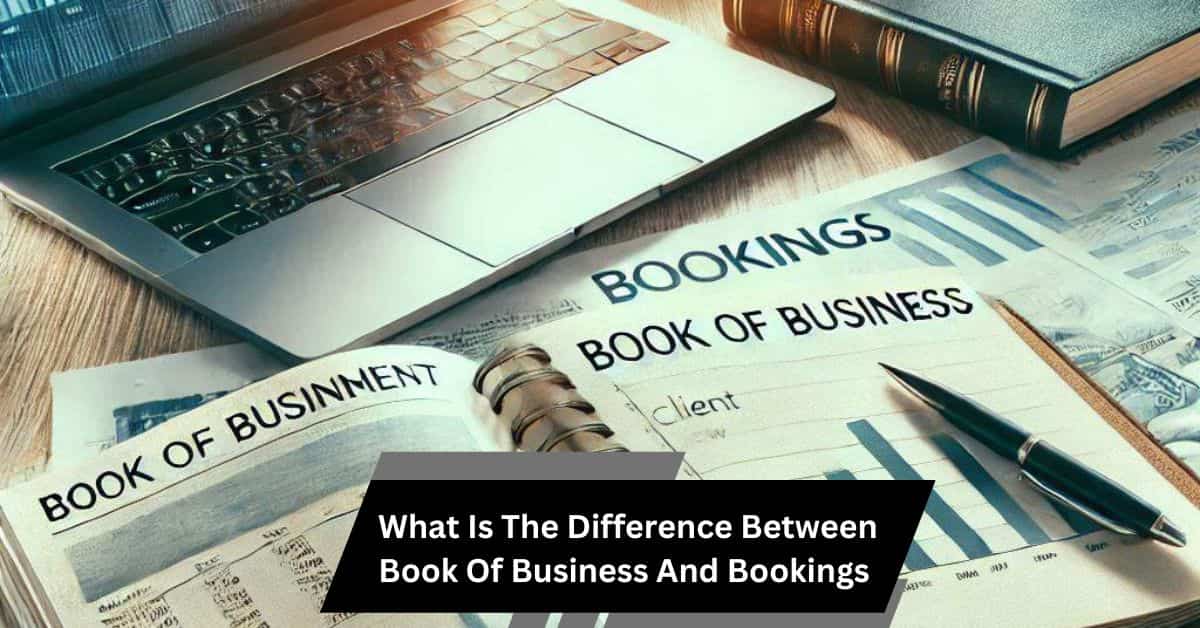Hi! When I first heard book of business and bookings, I thought they meant the same thing. Later, I learned they’re different, and understanding this helped me grow. Let me explain these terms simply and clearly.
What Is The Difference Between Book Of Business And Bookings? (Short answer)
The main difference between a book of business and bookings is their focus. A book of business represents long-term client relationships and recurring revenue, while bookings measure short-term sales or contracts secured during a specific period.
In this article, we will discuss What Is The Difference Between Book Of Business bookings.
What Is A Book Of Business?
A book of business is a portfolio of clients or accounts managed by a professional, such as in insurance or finance. It represents ongoing relationships and recurring revenue, showcasing long-term value and trust built over time.
Characteristics of a Book of Business
- Client-Centric: Focuses on building long-term client relationships over one-time transactions.
- Ongoing Value: Drives repeat business and referrals, ensuring sustainable revenue.
- Reputation: Reflects the professional’s trust, credibility, and industry standing.
Example Of A Book Of Business:
A financial advisor overseeing a portfolio of high-net-worth clients offers continuous guidance and tailored financial services. These clients trust the advisor, often referring friends and family, which expands the advisor’s portfolio and creates steady, long-term revenue.
What Are Bookings?
Bookings are the total value of sales contracts or revenue commitments secured within a specific timeframe, like a quarter or fiscal year. They highlight the business earned through transactions, reflecting sales success and growth potential.
Characteristics of Bookings
- Transactional Focus: Centers on the value of secured sales, not client relationships.
- Short-Term Metrics: Reflects deals made but not necessarily converted into earned revenue.
- Performance Indicator: Measures sales success and helps forecast future revenue.
Example of Bookings
A software company secures a $120,000 contract for a year-long subscription. The entire $120,000 is recorded as bookings at the time of signing, even though the revenue will be earned for the year.
Types of Bookings Available
In the SaaS business environment, bookings are categorized into several types, each with unique characteristics. Here’s a summary of the most frequently encountered types:
1. New Bookings
New bookings involve:
- Existing customers subscribing to additional services.
- First-time subscriptions or new customers signing up.
These bookings reflect business growth by onboarding new users or expanding service reach to existing clients.
2. Renewal Bookings
Renewal bookings refer to:
- Ongoing contracts that are due for renewal.
- Revenue is generated when a customer renews their subscription or agreement.
For instance, when a subscription reaches its renewal date, the agreed-upon renewal amount is included in the renewal bookings.
3. Upgraded/Expanded Bookings
Upgraded or expanded bookings occur when customers:
- Opt for higher-tier services or plans.
- Purchase additional features or services through upselling.
Example:
If subscribers upgrade from a Pro Plan ($500/month) to an Enterprise Plan ($2,000/month), they sign a new contract worth $24,000 per year. This constitutes an upgraded booking.
4. ACV/TCV Bookings
- Annual Contract Value (ACV): Represents the value of bookings for a minimum of one year’s committed revenue.
- Total Contract Value (TCV): Refers to the complete worth of a contract over its entire term, covering multiple years if applicable.
These types are especially relevant for long-term agreements, helping organizations understand revenue over a specific time frame.
5. Non-Recurring Bookings
These include one-time charges such as:
- Training costs.
- Setup or installation fees.
- Discounts provided during the agreement.
While most bookings in SaaS are recurring, non-recurring bookings also play a role in the total value calculation.
What Does Revenue Entail in the Sales World?
Revenue refers to the inflow of assets or the settlement of obligations resulting from a company’s primary activities. In the SaaS business, this typically involves delivering cloud-based services as per the agreement and service-level agreements (SLAs).
Key Points About Revenue:
- Difference from Bookings:
- Bookings: Total value of contracts signed during a specific period.
- Revenue: Realized income after fulfilling the obligations of the contract.
- Timing of Revenue Recognition:
Revenue is recognized when the service is delivered. For instance:- In a monthly SaaS subscription, revenue is recognized on a monthly basis throughout the duration of the subscription.
- Subscription Contracts:
SaaS products often rely on subscription contracts, where revenue is spread over the agreement’s duration. This ensures precise financial reporting and matches revenue recognition with the delivery of services.
Why Is A Book Of Business Important?
A strong book of business builds trust and loyalty with clients, ensuring consistent revenue through renewals and additional services. It demonstrates a professional’s ability to generate stable income, making it valuable in both mergers and acquisitions.
Building And Maintaining A Book Of Business
To build and maintain a strong book of business, focus on prioritizing client needs, maintaining regular communication, and offering tailored solutions. Regular analysis helps identify key clients and areas for improvement to ensure sustained growth.
Key Differences between Book of Business and Bookings
| Aspect | Book of Business | Bookings |
| Focus | Client relationships | Revenue from contracts |
| Time Frame | Long-term, often over years | Short-term, usually within a fiscal period |
| Value Measurement | Can increase through referrals and relationships | Captured at the time of securing a contract |
| Business Model Impact | Impacts ongoing revenue sustainability and growth | Directly impacts revenue forecasting and cash flow |
Why Understanding Both Matters?
- Strategic Growth: Balances relationship-building and transaction closure for sustainable growth.
- Forecasting: Combines both ongoing client relationships and secured transactions for accurate future income.
- Client Retention: Strengthens resilience by maintaining a strong book of business alongside bookings.
How To Manage A Book Of Business Effectively?
- Regular Communication: Stay in touch with clients to understand their needs.
- Personalized Service: Provide tailored solutions for each client’s unique requirements.
- Upselling and Cross-Selling: Explore opportunities to expand revenue from existing clients.
- Tracking Metrics: Monitor customer retention and lifetime value.
Strategies for Boosting Bookings
- Lead Generation: Utilize targeted marketing to bring in new clients.
- Efficient Sales Processes: Optimize workflows for faster deal closures.
- Special Offers: Offer discounts or promotions to increase interest.
- Performance Metrics: Continuously track booking success and areas for improvement.
Example Of A Book Of Business
A real estate agent builds a strong book of business by maintaining relationships with past clients and receiving referrals for new clients over time.
Example of Bookings
A catering service secures multiple bookings for events over the next few months, each adding to their short-term revenue.
How To Increase Bookings?
Here are some strategies to increase bookings:
- Enhance Sales Skills: Improve understanding and closing techniques.
- Study Market Trends: Adjust offerings to meet customer needs and industry changes.
- Use Technology: Leverage tools like CRM to streamline sales.
- Motivate Your Team: Provide incentives to boost performance.
How These Concepts Work Together?
A strong book of business can lead to more bookings through referrals and new clients. Successful bookings can evolve into long-term relationships, enriching the book of business and promoting sustainable growth.
Why This Matters To You?
Understanding the difference between a book of business and bookings helps you grasp how businesses balance long-term customer relationships with short-term growth. Whether managing a lemonade stand or a larger enterprise, maintaining loyal clients while securing new ones is key to success.
What Does Booking Entail in the Sales World?
In the sales world, booking refers to the total value of sales or contracts secured within a specific timeframe. It reflects the commitment from customers to spend money and the organization’s commitment to providing services in exchange for those funds.
Booking Has A Good Effect On All Kinds Of Businesses
Booking has a positive impact on all types of businesses, especially subscription-based ones. It allows these organizations to forecast future revenue, assess market responses, and refine their customer acquisition strategies for better performance.
Bookings Vs. Invoicing vs. Revenue for SaaS Companies
In SaaS, bookings represent the total value of signed contracts, indicating future revenue. Invoicing is the process of billing customers for services, impacting cash flow. Revenue is the actual income recognized over time, based on service delivery, reflecting true earnings in financial reports.
FAQ,s
1. What Is A Book Of Business?
A book of business refers to the portfolio of clients or accounts managed by a salesperson or company. It represents long-term relationships and recurring revenue.
2. What Are Bookings?
Bookings are the total value of sales or contracts secured within a specific time period. They reflect short-term revenue generation.
3. How Do Book of Business and Bookings Differ?
The book of business focuses on long-term customer relationships and recurring income, while bookings measure immediate sales performance and short-term revenue.
4. Why Is A Book Of Business Important?
A strong book of business ensures steady revenue, fosters customer loyalty, and supports financial planning.
5. Can a business have both a book of business and bookings?
Yes, most businesses rely on both metrics. The book of business provides long-term stability, while bookings drive short-term growth and performance.
6. How Can I Improve My Bookings?
To boost bookings, focus on lead generation, streamline sales processes, offer promotions, and monitor performance metrics.
7. What Is The Difference Between MRR And Bookings?
The difference between MRR (Monthly Recurring Revenue) and bookings is that bookings focus on one-time deals or new sales, whereas MRR represents consistent, recurring revenue on a monthly basis for long-term financial planning.
8. What Does A Book Of Business Mean?
A book of business is a list of clients a business handles. It helps you stay organized, track customers, build strong relationships, and make better financial or client-focused decisions for long-term success and growth.
9. What Is The Difference Between Bookings And ACV?
- Bookings: The total value of all signed customer contracts, regardless of the payment or contract duration.
- ACV (Annual Contract Value): The yearly revenue from a contract, calculated by dividing total bookings (TCV) by the contract term (in years).
10. What Is The Difference Between Booked Arr And Arr?
Booked ARR: Represents the total value of contracts signed in a specific period, showing past sales activity.
ARR (Annual Recurring Revenue): Reflects the recurring yearly revenue expected from active contracts, forecasting future revenue.
Conclusion
Understanding the difference between a book of business and bookings is essential for sales professionals and business owners. The book of business focuses on the long-term value of client relationships and recurring income, while bookings focus on the short-term value of contracts secured in a given period.
Both metrics are important for the overall financial health and forecasting of a business. By building a strong book of business, you ensure long-term revenue stability, while consistently increasing bookings drives short-term sales performance and future growth potential.



